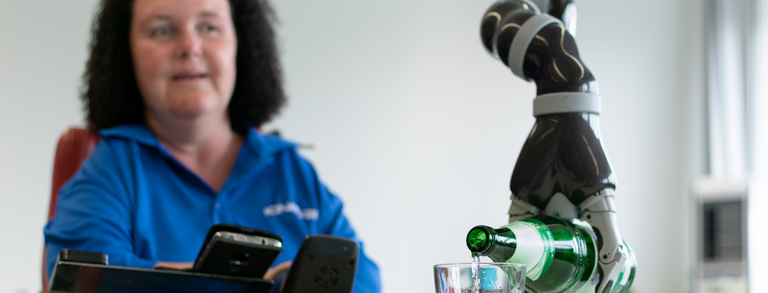Adaptive Degree-of-Freedom Embedding as a Cooperative User Interface for Assistive Robots
Motivation
Assistive robotic arms offer valuable support to people with limited arm or hand mobility. However, their usage can be strenuous and time-consuming because the robotic arm's seven movement options (degrees-of-freedom) typically correspond to merely two provided by a standard input device like a joystick. Because of this mismatch, switching manually between movement options is often necessary.
Goals and Approach
DoF-Adaptiv aims to simplify the use of assistive robotic arms through convolutional neural networks. Combining sensor-based situation recognition with algorithm-based controls creates an adaptive and cooperative AI control system. Unlike with automatic approaches, the human retains oversight and remains in control.
The project sets three focal points. The neural network develops suggestions for movement possibilities based on training data generated in virtual reality with VR controllers. Focusing on user-centered design processes for human-robot communication, options for displaying feedback are explored using data glasses. And - in a participatory approach - end-user requirements are investigated, and the system is evaluated accordingly by members of the target audience.
Innovations and Perspectives
The movement options suggested by the adaptive system streamline the control of assistive robots. This simplification can significantly increase the autonomy of the target audience in their daily lives.
Duration
02/2021 - 01/2024
Consortium
- Prof. Dr. Jens Gerken (Inclusive Human-Robot Interaction)
- Max Pascher (Inclusive Human-Robot Interaction)


